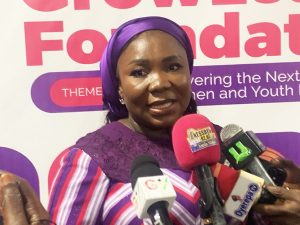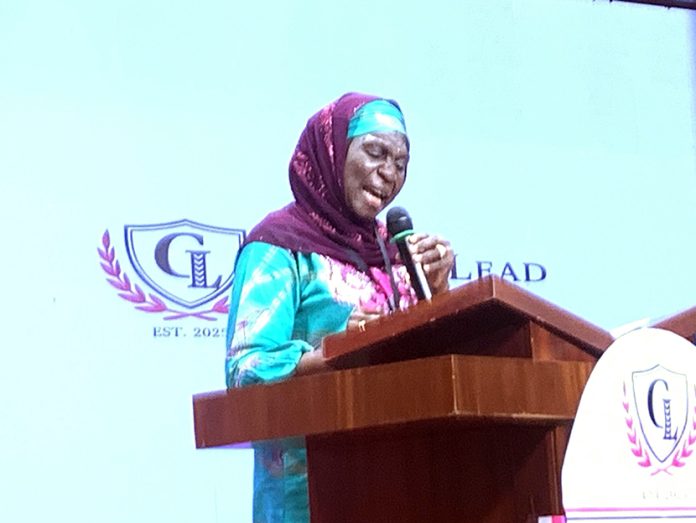A new wave of leadership is sweeping across Ghana, driven not by seasoned politicians or corporate elites, but by women and young people determined to transform their communities and reclaim their place in the nation’s leadership landscape.
At the centre of this movement is the GrowLead Foundation, a mentorship-based initiative founded by Ghanaian women professionals to promote women and youth empowerment through education, digital inclusion, leadership training, and entrepreneurship.
Youth as the Heartbeat of Ghana
Speaking at the launch of the foundation in Accra, Dr. Fatnmtu N-Eyare Sulemanu, an Islamic scholar and lecturer at the University of Ghana, described Ghana’s young population as the nation’s greatest untapped asset.
According her, more than one in every three Ghanaians is between 15 and 35 years old. That, to her, is not just a statistic, but is the heartbeat of our nation.

She warned that if Ghana fails to invest in its young people, the country risks wasting an immense pool of talent and potential.
“We are sitting on a time bomb if we ignore this, but also a powerhouse of potential if we choose to invest in it,” she added.
According to the Ghana Statistical Service, nearly 30 percent of Ghanaians aged 15–24 are underemployed, while a significant proportion of those employed remain in vulnerable, low-paying jobs with limited social protection.
Women Leading the Informal Economy, but Missing from Policy Tables
Ghana continues to lead Africa in women’s entrepreneurship, with nearly 46 percent of businesses owned by women. However, the story changes when it comes to decision-making spaces and representation in governance.
Currently, women occupy only 14.5 percent of parliamentary seats, which is well below the global average of 26 percent.
“We build homes and run markets, but we are not seated where national policies are made,” Dr.Sulemanu observed adding that “this is not just a gap in numbers—it is a gap in power.”
Women also face persistent challenges in education and technology.
Over 30 percent of Ghanaians above the age of six cannot read or write, and women make up 58 percent of this group.
Additionally, studies show Ghanaian women are 25 percent less likely to use digital technology and four times less likely to know basic computer programming skills.
“Leadership today is tied to information,” Dr.Sulemanu argued and also contended that “If we leave women and youth out of the digital revolution, we risk leaving them behind altogether.”
The GrowLead Foundation was established by a network of accomplished Ghanaian women, including Fatimatu Abubakar, former Minister for Information and Nazifatu Mohammed Abdulai, the foundation’s Executive Director.
For Fatimatu, the journey from Moshizongo, a small community in the northern region, to national prominence as a lawyer and public servant, was one shaped by self-determination and the absence of mentors.
“Until I became a lawyer, I had never been to Accra or even met a lawyer. That absence of role models shaped my mission,” she said.
This personal journey inspired the creation of GrowLead, to serve as a platform where young girls and women could find the mentorship and exposure she never had.
The foundation’s activities revolve around three key pillars – mentorship, empowerment and opportunity—all designed to help women and young people reach their full potential.
Under its educational support arm, GrowLead offers scholarships and financial aid to girls from underprivileged communities, helping them to remain in school and pursue higher education.
It also runs a structured mentorship programme, connecting young women with professionals and role models who guide them through academic, career and leadership pathways.
In addition, GrowLead provides entrepreneurship and digital skills training, particularly for women engaged in small-scale businesses, to enhance their competitiveness and sustainability.
The foundation also offers career guidance and internship placements, giving students and young graduates the opportunity to gain practical work experience and industry exposure.
To expand its reach, GrowLead plans to launch an online mentorship platform that will connect mentors and mentees virtually, ensuring that even girls in remote communities can benefit from the same opportunities as those in urban centres.
“We’re not here to host events and disappear. We are building a pipeline of women leaders – one cohort and one community at a time,”said NazifatuAbdulai, Executive Director of the foundation.
Focus on the North and Marginalized Communities
GrowLead’s initial focus is on Ghana’s five northern regions and Zongo communities—areas often excluded from national development conversations.
The foundation’s leaders stress that their mission is not charity but equity—ensuring that girls and young people in these underserved communities have access to the same opportunities as those in urban centres.
Research shows that every additional year of education for girls increases their earning potential by 20 percent, while youth participation in leadership results in stronger governance systems and improved social outcomes.
Follow the The Chronicle Newspaper channel on WhatsApp: https://whatsapp.com/channel/0029VbBSs55E50UqNPvSOm2z










